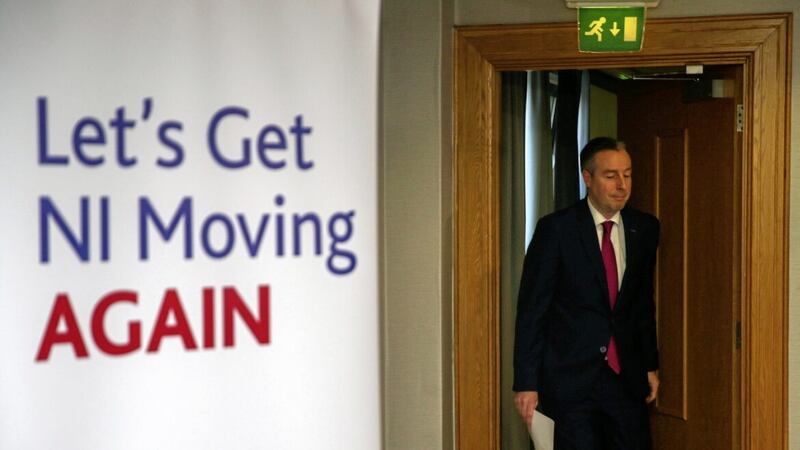THE first lever on indirect rule has been pulled, with the chief civil servant at the Department of Finance taking control of Stormont’s budget.
This emergency mechanism has only been used once before, following the 2017 collapse of devolution. It permits spending up to 95 per cent of last year’s budget, which might sound enough for normal service to continue. But the money will soon run out, by design.
When the legislation enacting the Good Friday Agreement was passed in 1998, government notes explained the 95 per cent mechanism “will almost certainly fall considerably short of the sums required”, in order to “provide an incentive to the assembly to reach an agreement”.
That did not work after 2017. As the collapse dragged on for three years, the government kept blinking first and putting full Stormont budgets through Westminster.
In theory, high inflation will bolster the DUP’s incentive to restore devolution. In reality, it just makes it even more implausible that Westminster will not step in to keep the lights on once again.
**
The EU wants a 25 per cent tariff applied to steel ‘imports’ from Britain to Northern Ireland for the remainder of this year, demonstrating the protocol’s limitless potential to drop random bombshells into our politics.
The mechanism for this reveals the underappreciated importance of quotas. The EU allows 4 per cent of its annual steel demand to be imported before tariffs apply. Many third countries get a specific share of the quota, so the UK could at least predict when its share would run out and use this to protect supplies to Northern Ireland.
However, after Russia invaded Ukraine, the EU merged several countries’ shares to protect its supplies, including the UK’s. So there is now an international race to fill the quota, at which point the tariff kicks in for everyone – including us.
The UK and others saw this coming when the policy was changed and asked for a quota to reflect “historical trade between Great Britain and Northern Ireland”.
But the EU said no, because this is not mentioned the protocol. The UK will certainly say no to imposing the tariff on itself.
So now what?
**
The Information Commissioner’s Office in Belfast has made a fool of itself after a member of the public wrote to the Ulster Museum under the Freedom of Information Act asking for all “the empirical evidence and hard science” it holds on evolution.
When the museum declined to respond, the complainant went to the commissioner, who told National Museums Northern Ireland to provide a “substantive response”. When this was not forthcoming, the commissioner warned failure to comply will be contempt of court.
Providing science lessons is not what the Freedom of Information Act is for, which is why it has an absolute exemption for “information reasonably accessible by other means”. The UK head office of the Information Commissioner defines this in the first instance as “information in the public domain”.
In other words, the Ulster Museum has merely been polite by not telling the complainant to go off and read a book.
**
A memorial stone has been placed at Palace Barracks, Holywood, to Dennis Hutchings, the former soldier who died of Covid last year while on trial for the attempted murder of John Pat Cunningham, a disabled man shot in 1974.
Following queries by the Cunningham family, the Ministry of Defence says it is not responsible as: “The Palace Barracks Memorial Garden is not an officially recognised MoD memorial. These memorials are requested, erected and maintained at private expense.”
The MoD is normally so protective of its image it claims copyright over military insignia on all private memorials, including headstones – on any land, let alone its own. There is an application process to the Secretary for Defence and only the family of the deceased can presume permission.
The Hutchings memorial contains his regimental insignia and is marked as erected by “his friends in Northern Ireland”.
**
Belfast City Council has unveiled measures to address the filthy state of the city centre.
A new street washing team has been created, with specialist cleaning to take place over the next few weeks in key shopping areas. There will be extra patrols by cleansing staff, plus a review of cleansing operations in residential neighbourhoods.
Officials are being coy about the cost, but a source told the Belfast Telegraph it adds up to “tens of thousands of pounds", to which the only response can be ‘is that all?’
It is sadly too believable that the council has left Belfast looking like a dump for the sake of half a middle-manager’s salary.
**
Sinn Féin-branded ‘Slow’ signs will not be removed from trees and lampposts in north Belfast, despite a complaint from the DUP about “hijacking road safety for party politicking”.
The Department for Infrastructure says the signs are not causing any problems for drivers – and that is the problem.
Meaningful unauthorised action would require instigating guerilla low-traffic neighbourhoods, to slow drivers down and make streets one-way. But Sinn Féin does not have the gumption.
Perhaps it does not like the sound of how low-traffic neighbourhoods are usually created – by blocking streets with planters.








